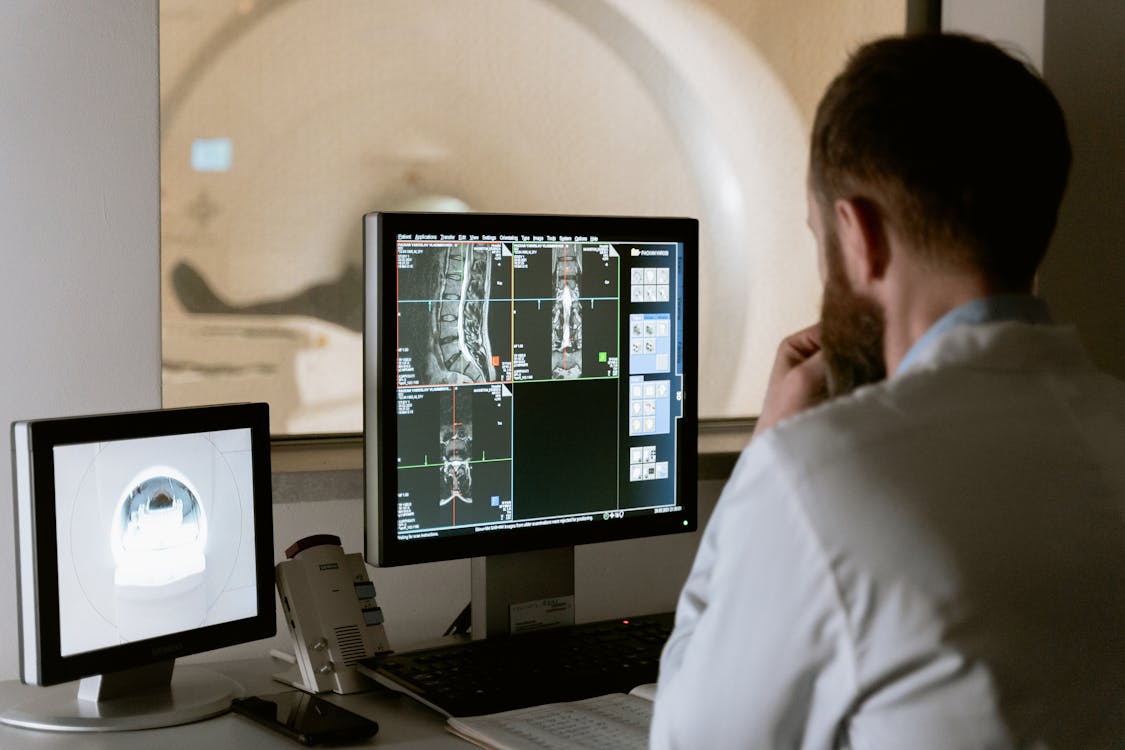 |
| photo by MART PRODUCTION from pexels |
1- Introduction
By enhancing patient outcomes, lowering costs, and boosting efficiency, artificial intelligence (AI) has a chance to completely transform the healthcare sector. AI has become an indispensable tool for doctors and nurses due to its capacity to analyze and understand tremendous quantities of data in real-time. This article will look at the role of AI in healthcare, its current uses, and how it might evolve in the future.
2- Current Applications of AI in Healthcare
AI has already been incorporated into various aspects of healthcare, including diagnostics, treatment, drug discovery, and patient monitoring. Here are some examples:
1. Diagnostics: AI can be used to analyze medical images and help diagnose diseases like cancer, heart disease, and stroke. AI-powered imaging techniques can detect even the smallest abnormalities that might be missed by human radiologists.
2. Treatment: AI can help in the development of personalized treatment plans by analyzing patient data, medical histories, and genetic information. AI algorithms can predict how a patient will respond to different treatments, helping doctors choose the most effective option.
3. Drug discovery: AI can analyze vast amounts of data to identify potential drug targets and predict the success of new drugs in clinical trials. This can accelerate the drug discovery process and reduce the time and costs associated with developing new drugs.
4. Patient monitoring: AI-powered wearable devices can continuously monitor patients' vital signs, alerting healthcare providers to potential health problems before they become serious. This can help prevent hospitalizations and reduce healthcare costs.
3- Future Potential of AI in Healthcare
As AI technology advances, its potential to change the healthcare business will only rise. Here are some of the potential effects of AI on healthcare in the future:
1. Precision medicine: AI may assist in the development of individualized treatment regimens based on a patient's genetic and medical data. This has the potential to result in more effective therapies with fewer adverse effects.
2. Predictive analytics: AI can identify which patients are at danger of acquiring particular diseases by analyzing massive volumes of patient data, allowing for early treatments and preventative measures.
3. Improved diagnostics: AI systems may be trained to detect patterns and abnormalities in medical pictures and other diagnostic procedures, increasing accuracy and lowering the chance of misdiagnosis.
4. Enhanced patient experience: AI-powered chatbots and virtual assistants can provide patients with 24/7 access to healthcare information and support, improving patient satisfaction and reducing the burden on healthcare providers.
4- Ethical Considerations
Despite the potential benefits of AI in healthcare, there are also ethical considerations that must be addressed. Some of the key ethical concerns include:
1. Data privacy: AI relies on vast amounts of patient data to function, and there are concerns about how this data is collected, stored, and used. Healthcare providers must ensure that patient data is protected and used in accordance with ethical guidelines.
2. Bias: AI algorithms can be biased, leading to discrimination against certain groups of patients. Healthcare providers must ensure that AI is used in a way that is fair and unbiased.
3. Human oversight: AI should not replace human healthcare providers but rather work in collaboration with them. There must be adequate human oversight to ensure that AI is used ethically and appropriately.
5- Conclusion
Artificial intelligence has the potential to transform the healthcare business by improving patient outcomes, lowering costs, and enhancing efficiency. Its present uses, which include diagnostics, therapy, drug development, and patient monitoring, have already had a substantial effect. As AI technology advances, its potential to alter healthcare is projected to increase. However, ethical concerns must be addressed to guarantee that AI is employed in a fair, unbiased, and patient-centered manner. We can guarantee that AI is utilized to enhance healthcare outcomes for everybody by balancing the benefits of AI with ethical issues.
References:
- Krittanawong, C. (2018). The Promise of Artificial Intelligence in Healthcare. Journal of the American College of Cardiology, 71(23), 2668-2669. doi: 10.1016/j.jacc.2018.03.514
- Topol, E. J. (2019). High-performance medicine: the convergence of human and artificial intelligence. Nature Medicine, 25(1), 44-56. doi: 10.1038/s41591-018-0300-7
- Wang, Y., Huang, C., Peng, Y., Jiang, D., Huang, K., & Chen, X. (2020). Artificial intelligence in healthcare: past, present and future. Seminars in Cancer Biology, 70, 298-306. doi: 10.1016/j.semcancer.2020.02.018
- Chen, X., Pan, Z., Hu, X., Zhang, L., & Hu, Q. (2019). Applications and future directions of artificial intelligence in healthcare. Journal of Medical Systems, 43(8), 174. doi: 10.1007/s10916-019-1401-7
- Char, D. S., Shah, N. H., Magnus, D., Implementing Machine Learning in Health Care—Addressing Ethical Challenges. N Engl J Med 2018; 378:981-983. doi: 10.1056/NEJMp1714229
